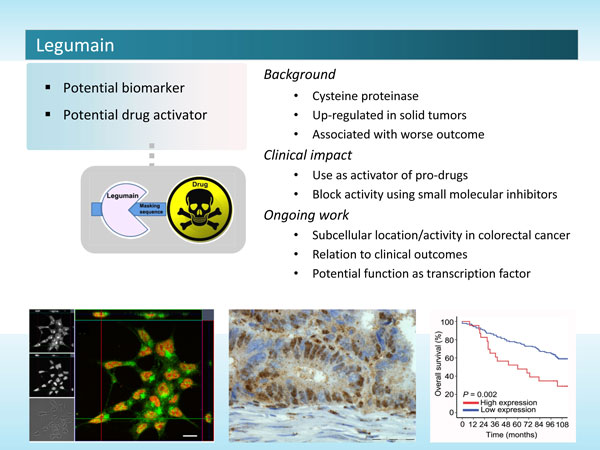Legumain
 |
Legumain
Proteloytic enzymes have repeatedly been associated with a metastatic phenotype and are believed to be of essential importance in several steps in the chain of events constituting the metastatic cascade. Proteolytic enzymes have been suggested as therapeutic targets and in cases where the mechanisms have been understood, both proteases and protease inhibitors have proven useful, while lack of pre-established comprehensive knowledge has led to failure in clinical trials (e.g. MMP inhibitors). The cysteine protease legumain has demonstrated stringent substrate specificity, and has been found over-expressed in several types of cancer. During cancer progression such proteases may dislocate from the lysosomes to the cell surface where they can be secreted. The extracellular microenvironment in many tumors is acidic and may thus allow cysteine protease activity also outside the lysosomes.
The protease has therefore been suggested utilized for pro-drug activation ensuring tumor-targeted delivery of chemotherapeutic drugs. Furthermore, the activation of legumain and cysteine cathepsins has been reported to be mutually dependent. The potential use of legumain as pro-drug activator or in other diagnostic or therapeutic interventions require elucidation of the exact physiological and patophysiological roles and detailed understanding of how the activity of these proteases are regulated in intact cells and organisms.
This project is supposed to reveal novel knowledge on localization, trafficking and on mechanisms activating the proteases and thereby unravel how the cysteine cathepsins and legumain may be utilized for diagnostic and/or therapeutic purposes. It is of particular interest to follow up our novel finding of nuclear localized legumain in colorectal cancer patients, and explore its biological function in the nucleus. This could have implication in transcriptional or epigenetic regulation and may represent novel therapeutic targets. The project is run in close collaboration with Prof. K. Brix at Jacobs University Bremen and Profs. H.T. Johansen and R. Solberg at School of Pharmacy, University of Oslo.
